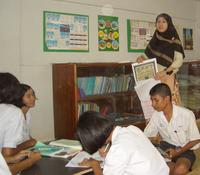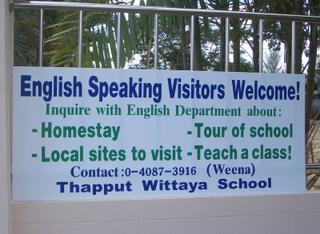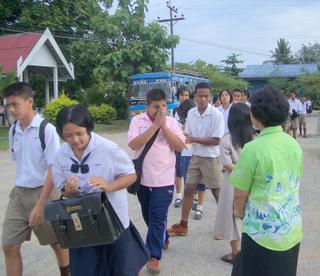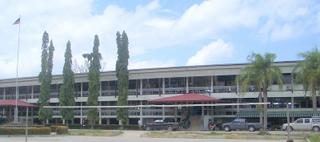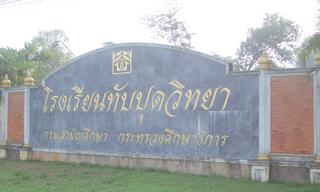



I had a good chance to visit Hawaii between July 25 - August 8, 2005. There were many interesting activities to share with you all. Here we go...
Teaching Southeast Asia :
Standard & Strategies
July 25-August 5, 2005
-
Mapping SEA and its cultural landscapes, by Barbara Andaya, Center for SEA Studies, University of Hawaii
- “Setting the Table” for Infusing SEA into your curriculum by Jean Johnson, New York University
- “Reading, Writing, and Dancing to the Global Beat” : Teaching about Cultures and Diversity through Exchange and Collaborative Projects,
by Richard Burniske, College of Education, University of Hawaii – Manoa
- Introduction to “Web Gems” and “Web Log” by Richard Burniske and Soo BooTan, Education Specialist, East-West Center
- Movement of people, Goods , and Ideas in Pre-Colonial SEA : Uncovering
History through Primary Sources, by Barbara Andaya
- Teaching about the Hindu-Buddhist World of SEA : Classroom Strategies, by Jean Johnson
- What makes a Ruler Legitimate? : A Lesson Demonstration, by Jean Johnson
- Culture Night announcement
-
Getting Credit for Your Work : Flinders University’s Studies of Asaia for Teachers/Gradute Topics by Distance by Doug Trevaskis, Topic Coordinator, Flinders University, Adellaide, Australia
- The Ramayana in SEA : Performance/Demonstration, byPatricia and Matt Dunn
- Will the “Real” Muslim Please Stand Up? Islam and Its Diversity in SEA, by Barbara Andaya
- Teaching about Islam and Its Diversity in SEA, by Jean Johnson and Gwen Johnson
- Maritime Trade and European Imperialism in SEA, by Leonard Andaya
- Preparing “Table Setting” by Gwen Johnson, Jean Johnson, Sue Peppers, and Soo Boo Tan
- “Web Gems” : Posting “Table Setting” Ideas on the Weblog by Soo Boo Tan
- Chinese in SEA, by Barbara Andaya
- #Teaching about SEA through Tales and Pictures, by Jean Johnson
# Interdisciplinary Teaching Strategies : Colonialism in SEA, by Gwen Johnson and Sue Peppers
- “Movie and Pizza” : Max Havelaar, by Barbara Andaya and Jean Johnson
- Revolution and Revolt : The Philippines’ Struggles for Independence, by Victor Ordonez, Senior Education Fellow, East-West Center and former Director UNESCO Regional Office for Asia and the Pacific
- Teaching about Issues of Decolonization : An Open Discussion, by Gwen Johnson
- Sharing Our World in SEA : Thailand, by Thai participants
- Exploring SEA in Honolulu : A Hands-on Expedition, by Peter Kiang, University of Massachusetts
- SEA in Our Schools : Strategies for Using Community Resources ,by Peter Kiang
- Sharing Our World in SEA : Indonesia, by Indonesian participants
- AsaiPacificEd’s Schools Helping Schools Initiative, by Namji Steinemann and Gwen Johnson
- Engaging Students in Real-World Issues and Developing School-to-School Connections through Schools Helping Schools, by Neil Ginsberg, Scarsdale High School
- Culture Night and SEA Food Fest
- Managing Digital Images Using PICASA, by Soo Boo Tan
- Classroom Applications : Teaching with Primary Sources, by Gwen Johnson and Sue Peppers
- The U.S. – Vietnam Relations, by Raymond Burghardt, Director of Seminars, East-West Center, and former U.S. Ambassador to Vietnam
- Three Views of Vietnam War, by Gwen Johnson and Sue Peppers
- The Destruction of Cambodia and Its Current Struggles , by Judy Ledgerwood
- Buddhism and Ideas of Cambodia Identity, by Judy Ledgerwood
- Sharing Our World in SEA : Cambodia, by Cambodian participants
- Classroom Application : Introducing Cambodia and Meeting Curriculum Standards, by Kelly McKee, Lake Forest High School, Chicago, Illinois
- Sharing My Reading “Picks” by Gwen Johnson and Sue Peppers
- Teaching with Oral Histories : Using Survivor Stories, by Peter Kiang
- Strategies for Teaching about Global Issues, by Kelly McKee
- Global Issues and Local Challenges in SEA : A Progressive Roundtable Discussion, by Richard Baker, East-West Center, Judy Ledgerwood, Northern Illinois University, Ricado Trimillos, University of Hawaii, Peter Xenos East-West Center, Kelly McKee, Moderator
- Institute Wrap-up, by Namji Steinemann
- Becoming an East-West Center Associate, by Larry Foster, President, Alumni Association of the East-West Center









